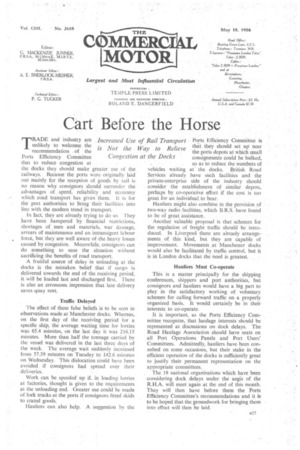Cart Before the Horse
Page 35

If you've noticed an error in this article please click here to report it so we can fix it.
TRADE and industry are unlikely to welcome the 'recommendation of the Ports Efficiency Committee that to reduce congestion at the docks they should make greater use of the railways. Because the ports were originally laid out mainly, for the reception of goods by rail is no reason why consignors should surrender the advantages of speed, reliability and economy which road transport has given them. It is for the port authorities to bring their facilities into line with the modern trend in transport.
In fact, they are already trying to do so. They have been hampered by financial restrictions, shortages of men and materials, war damage, arrears of maintenance and an intransigent labour force, but they are well aware of the heavy losses caused by congestion. Meanwhile, consignors can do something to ease the situation without sacrificing the benefits of road transport.
A fruitful source of delay in unloading at the docks is the mistaken belief that if cargo is delivered towards the end of the receiving period, it will be loaded last and discharged first. There is also an erroneous impression that late delivery saves quay rent.
Traffic Delayed The effect of these false beliefs is to be seen in observations made at Manchester docks. Whereas, on the first day of the receiving period for a specific ship, the average waiting time for lorries was 65.4 minutes, on the last day it was 216.15 minutes. More than half the tonnage carried by the vessel was delivered in the last three days of the week. The average wait suddenly increased from 57.39 rninines on Tuesday to 142.6 minutes on Wednesday. This dislocation could have been avoided if Consignors had spread over their deliveries.
Work can be speeded up if, in loading lorries at factories, thought is given to the requirements at the unloading end. Greater use could he made of fork trucks at the ports if consignors fitted skids to crated goods.
Hauliers can also help. A suggestion by the Ports Efficiency Committee is that they should set up near the ports depots at which small consignments could be bulked, so as to reduce the numbers of vehicles waiting at the docks. British Road Services already have such facilities and the private-enterprise side of the industry should consider the establishment of similar depots, perhaps by co-operative effort if the cost is too great for an individual to bear.
Hauliers might also combine in the provision of two-way radio facilities, which B.R.S. have found to be of great assistance. Another valuable proposal is that schemes for the regulation of freight traffic should be introduced. In Liverpool there are already arrangements_ of this kind, but they are capable of improvement. Movements at Manchester docks would also be facilitated .by traffic control, but it is in London docks that the need is greatest.
Hauliers Must Co-operate This is a matter principally for the shipping conferences, shippers and port authorities, but consignors and hauliers would have a big part to play in the satisfactory working of voluntary schemes for calling forward traffic on a properly organized basis. It would certainly be in their interests to co-operate.
It is important, as the Ports Efficiency Committee recognize, that haulage interests should be represented at discussions on dock delays. The Road Haulage Association should have seats on all Port Operations Panels and Port Users' Committees. Admittedly, hauliers have been consulted on some occasions, but their stake in the efficient operation of the docks is. sufficiently great to justify their permanent representation on the appropriate committees..
The 18 national organizations which have been considering dock delays under the aegis of the R.H.A. will meet again at the end of this month. They will then have before them the Ports Efficiency Committee's recommendations and it is to be hoped that the groundwork for bringing them into effect will -then be laid.
















































































































